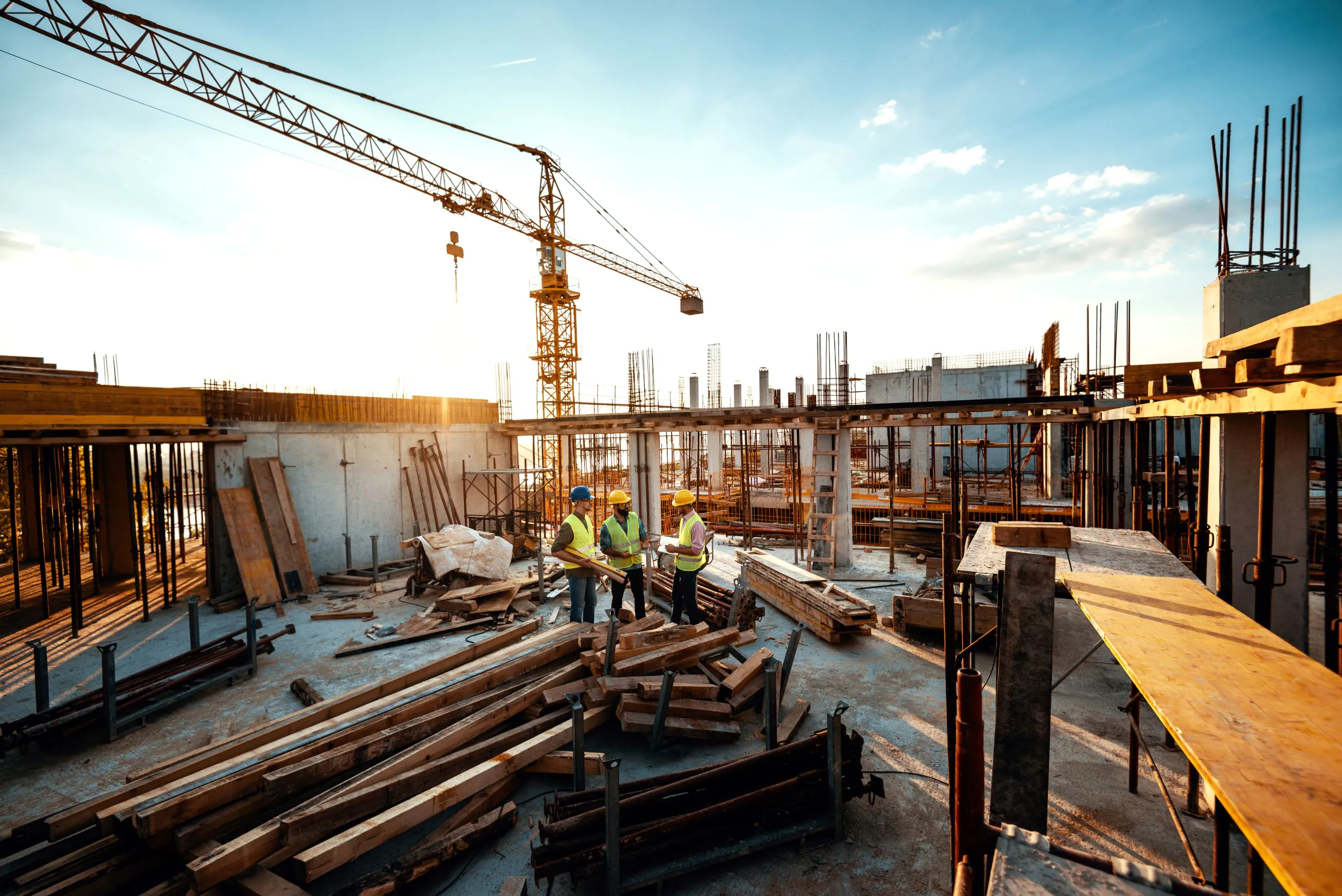The global construction industry has faced numerous supply chain challenges during the pandemic, with construction suppliers dealing with supply and labor shortages that result in building project delays and lost contracts. The market has begun to recover over the past year but material and worker availability continue to be a challenge, and industry experts predict that these factors will constrain the market for some time to come.
Since these supply chain challenges are ongoing, construction suppliers and builders are looking for ways to adapt and succeed in this new environment. Here are some of the issues construction companies are facing and how they can mitigate supply chain risk.
Access Free Construction Industry Insights
Material Shortages
Many essential construction materials are currently in short supply, including lumber, steel, cement, and paint. Manufacturers who cannot obtain the needed materials on time or at all face delayed or cancelled orders, meaning lost revenue, delayed payments, and potentially damaged business relationships. Builders face similar issues with their clients if they’re unable to procure the needed supplies from manufacturers. So how are construction suppliers and builders dealing with these setbacks?
At this point in the pandemic, “unforeseen circumstances” is rarely an acceptable basis to extend a contract due to COVID-related delays, as these supply chain disruptions have become well-known and expected. Instead, some businesses are drafting contracts that make allowances for delays that could not be reasonably avoided, providing some leeway in terms of time and money to construction suppliers facing industry-wide shortages. This can help build strong relationships with suppliers and acknowledge the current global uncertainties that are currently inherent in the industry.
This measure doesn’t itself help builders mitigate delays or losses due to material shortages, however. This can be a more difficult challenge to navigate, but there are ways to adapt and streamline processes in order to account for it. Transparency in the supply chain can help: building strong relationships with construction suppliers and sharing data with each other can help improve efficiency and scheduling. The sooner the other party knows about one’s needs or about specific supply challenges, the easier it is to adapt and make plans. Having sufficient data on the market to be able to distinguish between genuine demand and panic buying can also help companies determine how much of a given resource they really need and where best to focus their efforts.
Some businesses are changing the way they plan projects, deferring certain decisions and locking in others early. Contractors are ordering materials before a contract is finalized, so that the price and availability of those materials are known when the contract is made. They may also begin preparatory work — such as demolition or building foundations — before the final details of the main project have been settled, allowing them to progress the project and plan out resources in advance.
Another way to offset the impact of delays and price fluctuations is by making other aspects of the project more efficient. For example, many more builders are now sourcing prefabricated components in order to reduce the amount of time spent working on-site. Construction suppliers are looking to digitisation and automation to streamline manufacturing processes, saving time and expense in the long run.
Labor Shortages
There are several factors contributing to the current labor shortage in the construction industry. The pandemic is one, causing people to avoid jobs that involve working closely with others in person, as well as causing the loss of many people due to the virus. It has also restricted the number of people able to work in a given location at a time.
Construction suppliers and builders have put many safety measures in place and work has gradually been returning to normal, but the labor shortage continues. Aside from the workers who are now unable to return to the job after catching COVID, the construction industry is also dealing with an ageing workforce and a lack of skilled workers. Not enough new workers are entering the industry to replace those ageing out of it, and as construction companies adopt more advanced equipment and technologies, the amount of skill needed to do the work has risen.
To combat this, many construction suppliers and builders are offering more incentives to their employees. Higher wages, sign-on bonuses, benefits, and flexible work hours are just some of the methods companies are using to attract and retain workers. Investing in training can also make a job more attractive, as well as help solve the need for skilled workers.
Growth is on the Horizon
Supply chain issues may continue to be a challenge over the coming years, but the global construction industry is picking up steam and analysts predict significant growth ahead for construction suppliers. Construction is a key segment for countries around the world, and many governments will be investing money into infrastructure and other projects to help their economies recover from the impact of the pandemic.
According to Oxford Economics, the global construction market was valued at US$10.7 trillion in 2020 and is expected to surpass US$15 trillion by 2030, growing at a faster pace than both the manufacturing and service sectors. Rising populations in emerging markets are expected to help drive this growth, as well as increasing investments in renewable energy sources and power storage and transmission. Demand will be particularly high in China, India, the US, and Indonesia, which together are expected to account for over half of the global growth in the construction industry.
Leading Construction Suppliers and Builders
Company |
Key Product and Service Areas |
HQ |
Company Type |
| Bechtel | Construction, project management, engineering, procurement | USA | Private |
| China Communications Construction Company | Construction, real estate | China | Public |
| China State Construction Engineering Corp. | Construction, engineering, real estate | China | Public |
| Daiwa House | Construction, prefabrication, real estate, logistics | Japan | Public |
| Vinci | Construction, energy, concessions | France | Public |
| ACS | Construction, engineering, facility management | Spain | Public |
| Bouygues | Construction, real estate, media, telecommunications, transportation | France | Public |
| Samsung C&T Corporation | Construction, engineering, trading, real estate | South Korea | Public |
| Larsen and Toubro | Construction, engineering, oil, power | India | Public |
| Skanska AB | Construction, infrastructure development | Sweden | Public |
Evaluate Construction Companies
Construction Industry Segments to Watch
Construction Materials
As with its parent market, the construction materials industry faced a slump in demand in 2020 but is now recovering, with industry experts predicting growth of over US$1.1 billion between 2020 and 2025 at a CAGR of 16%. The increasing number of smart cities being built will impact the amount and type of materials in demand during this period, as interconnectivity becomes more important than ever. The growing adoption of prefabricated components is also influencing construction material suppliers, along with an increase in demand for high-performance, durable materials.
Key construction material suppliers include:
- Adbri
- Cementir Holding NV
- Cemex
- CRH plc
- Fosroc Inc.
- Fujairah Cement Industries
- HeidelbergCement
- Holcim
- PPC
- Sumitomo Osaka Cement
Structural Steel
Steel is one of the most common materials in the construction industry, with the structural steel industry being valued at close to US$100 billion in 2020. Construction is the highest source of demand for steel, as it is strong, sustainable, and affordable. As the world increases its focus on sustainability and the construction industry continues to grow, steel will be in higher demand than ever.
Steel construction suppliers include:
- ArcelorMittal
- Baosteel Group
- Evraz
- Gerdau
- Hyundai Steel
- JSW Steel
- POSCO
- Nippon Steel Corporation
- Tata Steel
- SAIL
View More Construction Industry Sectors
Construction Chemicals
While construction chemical suppliers aren’t expected to see as high a growth rate as the materials segment, the market’s higher overall value means they will still see an increase of nearly US$14 billion by 2025. APAC is by far the leading region for construction chemicals and is predicted to make up more than 70% of global industry growth. Leading countries in this industry are China, the US, India, Japan, and Germany.
Key construction chemical suppliers include:
- 3M
- Albemarle
- Arkema
- BASF
- Dow
- Mapei
- OTT HydroMet
- RPM International Inc.
- Sika AG
- R. Grace and Co.
Construction Suppliers on BizVibe
With continued supply chain uncertainty, it’s important to find reliable buyers and suppliers that fit your needs. BizVibe’s platform contains more than 230,000 construction company profiles which are free to view. Each profile consists of in-depth company insights, comprising 50+ data points, including full industry trend and challenge analysis for 10 construction categories.



